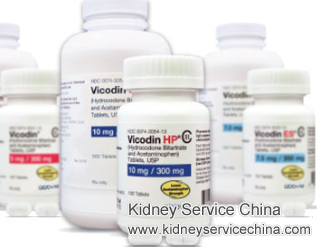Is Vicodin Safe for Chronic Kidney Disease Patients
 Because of back pain, headache, painful legs or feet, abdominal pain, and so on, Chronic Kidney Disease patients need to take pain killers to relieve them. Vicodin is one common pain killer, because it contains both acetaminophen and hydrocodone. However, quite a part of pain killers have renal toxicity, so kidney patients are required to avoid these medications. Then, is vicodin safe for kidney patients?
Because of back pain, headache, painful legs or feet, abdominal pain, and so on, Chronic Kidney Disease patients need to take pain killers to relieve them. Vicodin is one common pain killer, because it contains both acetaminophen and hydrocodone. However, quite a part of pain killers have renal toxicity, so kidney patients are required to avoid these medications. Then, is vicodin safe for kidney patients?
So far, no research has definitely proven vicodin has renal toxicity, but the pharmacist does suggest patients to tell their doctor in advance if they have kidney or liver disease. That is to say, vicodin may have some potential side effects for these patients.
The common side effects of vicodin for CKD patients
Vicodin is often used to relieve moderate or severe pain. As one common painkiller, its most frequent side effects include dizziness, nausea, vomiting, browsiness, feeling weak, low blood pressure, and so on.
In severe cases, some infrequent adverse reactions may also happen. They are constipation, change in pulse, feeling confused, fast heartbeat, trouble breath, significant decrease in lung function, difficulty in urinating, etc. If kidney patients suffer from difficult urination, their illness condition may be aggravated quickly as extra fluid and waste products build up in the body.
Can Chronic Kidney Disease patients take vicodin safely?
From the above analysis, we can know although vicodin doesn’t affect kidney condition, it does cause some side effects for kidney patients easily. Therefore, if you want to use this medication to alleviate your pain, you should consult the doctor in detail and take correct dosage.
Other notice
If kidney patients’ pain such as headache and back pain is associated with kidney problem, only depending on painkillers won’t work very well. In this case, you can use some systemic therapies to deal with the underlying cause and improving your kidney condition with online doctors’ guidance.
Tag: CKD Treatment CKD

